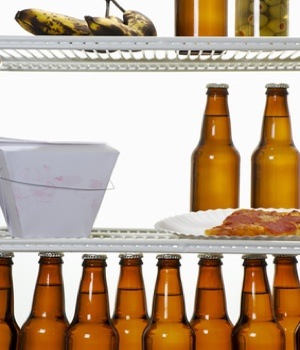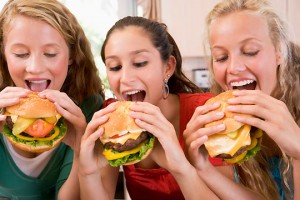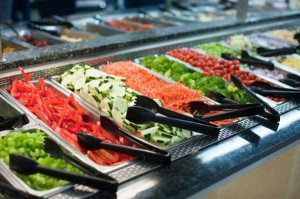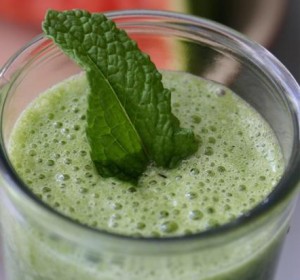If you’re headed off to college or have already started, you’ve probably heard of the notorious “Freshman 15.” While a recent Ohio State University study showed this to be a myth, the study also showed that the average student gains about 2-1/2 to 3-1/2 pounds during their freshman year with weight gain continuing apace throughout college. Typically, by the end of their college years women have gained 7 to 9 pounds while men have gained between 12 and 13 pounds. After graduation, students followed in the study typically continued to gain weight at a rate of about 1.5 pounds per year.
Personally, I didn’t gain weight in college until my junior year abroad in Australia, where apparently I really let loose. From freshman year to senior year I gained over a whopping 15 pounds! By the way, this article is relevant for anyone- student or not- who finds themselves in a slump. This may apply to your work cafeteria.
Why College Students Gain Weight

Many factors contribute to the lifetime of weight gain that often begins in college. Some of the factors include:
- Poor eating habit
- Sedentary lifestyle
- High intake of processed and fast foods
- Toxicity from pesticides and other environmental toxins
- High sugar intake
- Stress
- Unhealthy food choices in campus dining halls
- Financial pressures leading to unhealthy food choices
- Consumption of alcoholic beverages (and post-partying “late night” pizza indulgences!)
- Unhealthy snacking
- Soda consumption
A trip through a college dining hall shows a plethora of choices, and sometimes it’s hard to make the right one. Many dining halls now take a restaurant-style approach to meals, offering an array of entrees, sides, salads, desserts, and beverages. Many cafeterias feature tempting choices like burgers and fries, sugary cereals, milk, cinnamon rolls, and soda pop, among many others. It’s easy to see how quickly one can abandon healthy food choices in favor of foods with lots of calories, chemicals, and very little nutritive value.
Many college students are nearly broke, or have a food budget they need to stretch to put it nicely. When not eating in the dining hall, they may opt for inexpensive processed and fast foods with little by way of nutrition. Everyone asks how to eat healthy on a budget, and it all starts with preparation and research.
Why Eating Healthy Matters
Many young adults don’t realize the importance of making healthy food choices. With metabolisms that haven’t yet malfunctioned, young adults often fall pretty to the belief that they can eat pretty much whatever they want without any health consequences. But that “bottomless pit” phenomenon in childhood through high school starts to shift in college, and eating healthy is truly important. Here’s why:
- Making healthy food choices can build your immune system, keeping you healthier and protecting you from illness.
- Making healthy food choices throughout life leads to better long-term health, protecting you from diseases such as cancer, osteoporosis, and heart disease.
- A recent study shows that the food choices you make today may actually affect your children’s and grandchildren’s DNA.
- Eating a great deal of processed and fast foods can contribute to toxic buildup in your system. As you age, you may begin to notice the symptoms of toxicity from these foods ranging from dull or acne-prone skin to serious autoimmune disease.
- Choosing health foods can give you more energy, better brain power, better stress management skills, and many other positive benefits that affect the quality of education you receive while in college.
- And yes, of course, you can start to pack on unwanted pounds, which isn’t just about aesthetics but also affects your health in myriad ways.
Making Healthy Food Choices
Buried among all of the food choices available to college students are foods that will help sustain your good health, now and in the future. Here are my tips for eating healthy in college.
Head for the salad bar. Plant foods – living foods – provide vital nutrition and enzymes. While salad bars often have some bad choices intermingled with the good, you’ll do well to pile your plate high with fresh, colorful veggies. If the dining hall has a blender available, you can even grab some greens and fruit and make yourself a GGS from salad bar ingredients. If you’re eating salad, make a quick lemon and vinegar dressing, and avoid processed meats (ham/bacon), dairy-based dressings (ranch, blue cheese, thousand island), cheese, and croutons. You can also mash part of an avocado throughout your salad, which is a whole food rather than using oil for a bit more denseness. You can top your salad with a veggie burger if that’s available, or some avo or cooked veggies like sweet potatoes.
- Opt for oats. Skip pre-made cold cereal for breakfast. Instead, start with a piece of fruit followed by sugar-free oatmeal. Skip the instant oatmeal if that’s the only option available.
- Get a dorm fridge and a blender. If you’re living in the dorms, there’s no need to be completely at the mercy of unhealthy snacks. You can stock your dorm fridge with fresh produce, almond milk, gluten-free bread, and raw nuts. If you’ve got a blender, then you can start your day with a GGS. You can also make the filling Power Protein Smoothie with items that you can easily stock in your room.
- Avoid dairy. I’ve made no secret of the fact that dairy is really bad for you. Skip food products with dairy ingredients such as milk, cheese, and butter. Your skin will look so much better also.
- Minimize alcohol intake. Alcohol is okay in moderation, but avoid mixing it with sugary mixers or drinking a ton of beer (no keg stands!). Instead, have an occasional glass of red or white wine or stick to simple drinks like vodka and soda water. When you eat better, your body is cleaner and you end up needing way less alcohol to get a buzz.
- Skip the soda and energy drinks. Soda is full of acidifying chemicals, as well as sugar and/or toxic artificial sweeteners. Avoid those diet soda fountains also!! There’s not a single good thing I can say about soda, which is generally everywhere on college campuses. Instead, get a good water filter and a reusable non-plastic or non-leachable plastic water bottle to carry with you.
- Minimize animal protein. Make an effort to eliminate meats altogether, or to only include it in your meals a few times per week. When you do eat animal proteins, opt for eggs or lean poultry. College campuses are most likely not going to have grass-fed, local animals- they are most probably sourcing from factory farms, where the animals are injected with steroids and hormones that become part of what you consume.
- Find healthy entrees. Typically, cafeterias have vegetarian choices that include whole grains and veggies. Whenever possible, choose these for an entrée, and eat it after you’ve had a big salad. You can make requests too, and possibly band together with your buds to lobby to your school counsel for more vegetarian entrees!
- Keep healthy snacks on hand. It’s easy to give into temptation when you are busy or stressed out. Keep healthy snacks such as fruit, veggies, gluten-free crackers, and raw nuts on hand so that you don’t head to the candy machine during a marathon study session.Skit
- Minimize caffeine intake. It may seem like the only way to make it through finals week is with a ton of caffeine, but caffeine can leave you jittery and strung out, and mess with your adrenals. If you need a little additional energy, up your intake of complex carbohydrates such as seeds or whole grains, and get some exercise.
There you have it. Freshman 15, be banned!!


 Head for the salad bar. Plant foods – living foods – provide vital nutrition and enzymes. While salad bars often have some bad choices intermingled with the good, you’ll do well to pile your plate high with fresh, colorful veggies. If the dining hall has a blender available, you can even grab some greens and fruit and make yourself a GGS from salad bar ingredients. If you’re eating salad, make a quick lemon and vinegar dressing, and avoid processed meats (ham/bacon), dairy-based dressings (ranch, blue cheese, thousand island), cheese, and croutons. You can also mash part of an avocado throughout your salad, which is a whole food rather than using oil for a bit more denseness. You can top your salad with a veggie burger if that’s available, or some avo or cooked veggies like sweet potatoes.
Head for the salad bar. Plant foods – living foods – provide vital nutrition and enzymes. While salad bars often have some bad choices intermingled with the good, you’ll do well to pile your plate high with fresh, colorful veggies. If the dining hall has a blender available, you can even grab some greens and fruit and make yourself a GGS from salad bar ingredients. If you’re eating salad, make a quick lemon and vinegar dressing, and avoid processed meats (ham/bacon), dairy-based dressings (ranch, blue cheese, thousand island), cheese, and croutons. You can also mash part of an avocado throughout your salad, which is a whole food rather than using oil for a bit more denseness. You can top your salad with a veggie burger if that’s available, or some avo or cooked veggies like sweet potatoes.


fyi
similar is the L.A. 15…. move from (the walking city) NYC to L.A. (the driving city) and it’s easy to gain 15.
How come Dairy Products like milk is harmful i have read that it contains riboflavin which is very good for skin plus how can you ignore the calcium that it contains?
Hi Kimberly,
I liked this article! I finished college a year ago, but this would have been so useful to me at the time. Question for you: do you know which stores sell quinoa pasta? I checked Trader Joes and Whole Foods and couldn’t find it (maybe I missed it though). Thanks!
Hi Kelsey,
Sprouts, Whole Foods have it. At Whole Foods look in the gluten free section :0)At Sprouts it is in the regular pasta section.
Quinoa is a natural grain not a pasta, so it will be found in the grain isle. Hope this helps!
Dairy is harmful because it is acidic and actually makes your body lose calcium. Leafy greens like kale or spinach are way better sources of calcium than milk.
Kim,
Is eating too much fruit bad? (because of the fructose.) I haven’t been eating grains or potatoes but am considering adding them back into my diet.
Hey Kimberly,
Thank you so much for addressing this issue; I am starting second year at university, and had already gained 15 pounds after first year!!! I am now living out of rez, and have my own apartment, so hopefully, once my blender arrives, I’ll live off of your GGS, and I’ll lose all this nasty built up toxicity and waste! Thanks!
perfect timing for this article! i was worried about moving on campus next year,
On the topic of college i was wondering what to eat before a long exam? the smoothie is great but it doesn’t keep me full for a three hour exam, any recommendations?
Hi Kimberly,
When is the best time to eat nuts? If we’re supposed to eat protein only later in the day, does that mean that nuts would be one our protein at dinner or possibly as dessert, assuming I don’t have anything starchy at dinner? Are they ever okay to have as an afternoon snack or on a lunch salad? I don’t want to miss out on eating nuts but I just don’t know when it’s best to eat them according to the food pairing and order rules, so unfortunately I’ve been avoiding them. Thanks so much for your help!
Julia
Starting off with a positive statement opens the diaglog whereas a negative statement will shut it down! Further, you probably want to add to the discussion versus complaining. So much for social skills.
It is the best time to make some plans for the future and it
is time to be happy. I’ve learn this submit and if I may just I desire to counsel you some fascinating things or advice. Perhaps you can write subsequent articles referring to this article. I wish to read more things approximately it!
i have her book but i can’t find the part on alchohol
i know it says drink stuff like vodka or something like that
and it says beer is bad but dark beer is better if you are drinking beer. but it’s still bad
but wtf.. like i’m late for work.. i need this information now
there’s no index in her book. it’s becoming a fricken circus. can someone e-mail me this is they know what section of the book it is in
noonanj4@hotmail.com
Hi, yeah this piece of writing is genuinely good and I have learned lot of things from
it on the topic of blogging. thanks.
I used to be suggested this website by means of
my cousin. I’m no longer certain whether or not this post is written via him as no one else recognize such precise about my problem. You are wonderful! Thank you!
Wonderful, what a blog it is! This web site provides
useful facts to us, keep it up.
You realply make it seem so easy with your presentation but I find this tokpic to be really something which
I think I would never understand. It seemms too complicated and verry broad for
me. I’m looking forward for your next post, I will try to get the hang of it!